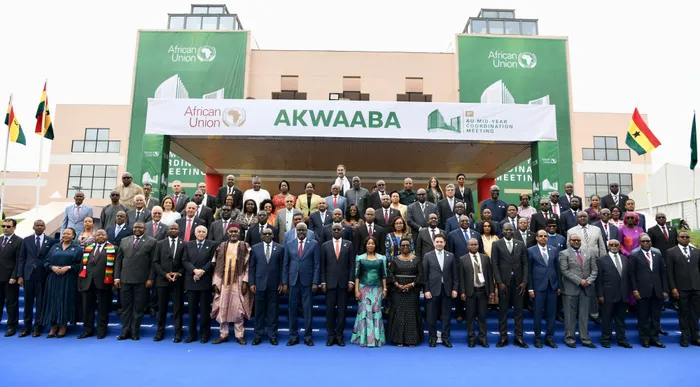Trump's Re-Election: A New Era of Re-Awakening for Africa?

Members of the African Union (AU) Executive Council at its 45th Ordinary Session meeting held on July 18-19, 2024 in Accra, Ghana. The time is now for Africa to awaken from its slumber and for the leadership to rise to the occasion and harness African energies to promote genuine governance that brings and sustains livelihoods for posterity, says the writer. Picture: Katlholo Maifadi/DIRCO
Langton Makuwerere Dube
THE re-election, subsequent inauguration, and aftermath of Donald Trump's presidency have dominated media coverage, mainly his populist, nationalist, and transactional approach to foreign policy and economic interests.
Indeed, debates continue to rage on the implications of his presidency for various geopolitical landscapes.
His brash and candid personality has generated controversy and competing interpretations. To some, he is a gorgon, and a fascist far-right leader bent on reversing centuries-old achievements of the free world. To others, he is a Patriot par excellence reelected to Make America Great Again (MAGA).
To many in the global South, tinkering in the peripherals, he remains an enigma with pseudo-anti-colonialists glibly fascinated by the apparent chaos affecting American democracy, using it as a pretext to justify the crowding out of the democratic space.
But that is beside the point.
Trump may be all that and more, but his anti-globalist, isolationist posture should be a wake-up call to the Africans.
His withdrawal of the United States of America from the World Health Organization and the brief moratorium on funding to programs run under the United States Agency for International Development (USAID) and the United States President’s Emergency Fund for AIDS Relief (PEPFAR) has caused panic and despair in Africa.
Announced in a purely Trumpist fashion, it sent shockwaves across Africa, where millions continue to depend on external aid and benevolence. Indeed, I will not be drawn into specific figures about HIV/AIDS infection rates, epidemiological trends, and so forth, save to mention that the initial move to withdraw funding and support spells doom for many on Anti-Retroviral Treatment across Africa.
While he may not be my cup of tea, and despite the possible health and epidemiological disaster that the suspension of funding could have portended, I am firmly convinced that this was a necessary antidote for the African malaise, stupor, or malfeasance, whatever you call it.
While others may argue that his actions were and remain retrogressive to multilateralism, some of us were not surprised.
As a disclaimer, I am not trying to tout the ‘Rite of Committal’ to those living with HIV. I am also sensitive to the eventual consequences that could have directly or indirectly on those affected in Africa.
Therefore, I am convinced that despite the lifting of the brief moratorium on funding, the time is now for Africa to awaken from its slumber and for the leadership to rise to the occasion and harness African energies to promote genuine governance that brings and sustains livelihoods for posterity.
The demarcation between life and death has always been blurred for many across the continent. Lives have been ‘ghettoized’ through a concoction of acute unemployment, corruption, human suffering, diseases, and pestilences, the decay of state institutions, and the general dereliction of society’s ambience.
For a continent richly endowed with an abundance of resources, a favourable demographic dividend, and other fundamentals that buttress her potential, Africa’s troubles have remained one for the ages.
We can label Donald Trump all we want, and yes, he may not be the most pleasant figure at the table, but he hit the bull’s eye on this.
Africans should awaken from their slumber.
Leaders have been sitting on their laurels, looting public funds, unmoved by the massive cesspool of misery and hopelessness of their people. Instead, they fan divisions, fund wars, and sustain patronage networks, sating their appetite for lavish consumption of Marie Antoinette proportions.
While doing this, they confidently know they will get millions in donor support from those they claim to despise ideologically.
The brief suspension of funding left the African population apprehensive and hopeless, to say the least.
The COVID-19 pandemic should have been a wake-up call, especially in specific countries on the continent plagued by feeble health delivery infrastructure, which quickly gets overwhelmed.
But as usual, we lack inertia. Everything always finds us where we are, typical of cyclical time.
As if COVID-19 was the first, no, actually, we have had Ebola, Marburg, Cholera, and many other communicable diseases whose transmission and lack of epidemiological control has always pointed to acute state weakness, if not failure. Indeed, we have learned nothing, if it is not colonialism, then it is external interference, climate change, or some other bizarre calamity that is responsible for our condition. We duck responsibility and scapegoating has become our verbal staple.
In 2014, at a Leadership Summit in Kigali, former President of South Africa, Thabo Mbeki, called for self-introspection as the first step in creating the Africa we want because charity begins at home.
Not only are we masters of diversion, but we are also champions of kneeling and grovelling, relegating ourselves to the weft of begging for donor support.
As a corollary, this has cultivated a victimhood mindset that makes us appear like objects of pity and suffering, and to cap it all, we are proud of that suffering before the world.
Whether isolationist, transactional, immoral, or whatever, Trump is promoting American interests, and African leaders should do likewise. When one moves around Africa, one cannot but notice the energy, zeal, and optimism engraved on the faces of its sons and daughters amidst the despair and hopelessness that continues to limit imagination and potential to earshot and eyeshot. Maybe the time is nigh, and Donald Trump may have catalyzed it.
* Dr Langton Makuwerere Dube is a postdoctoral research fellow in the Center for Africa Studies (CACS) at the University of Johannesburg Confucius Institute (UJCI).
** The views expressed in this article do not necessarily reflect the views of The African.